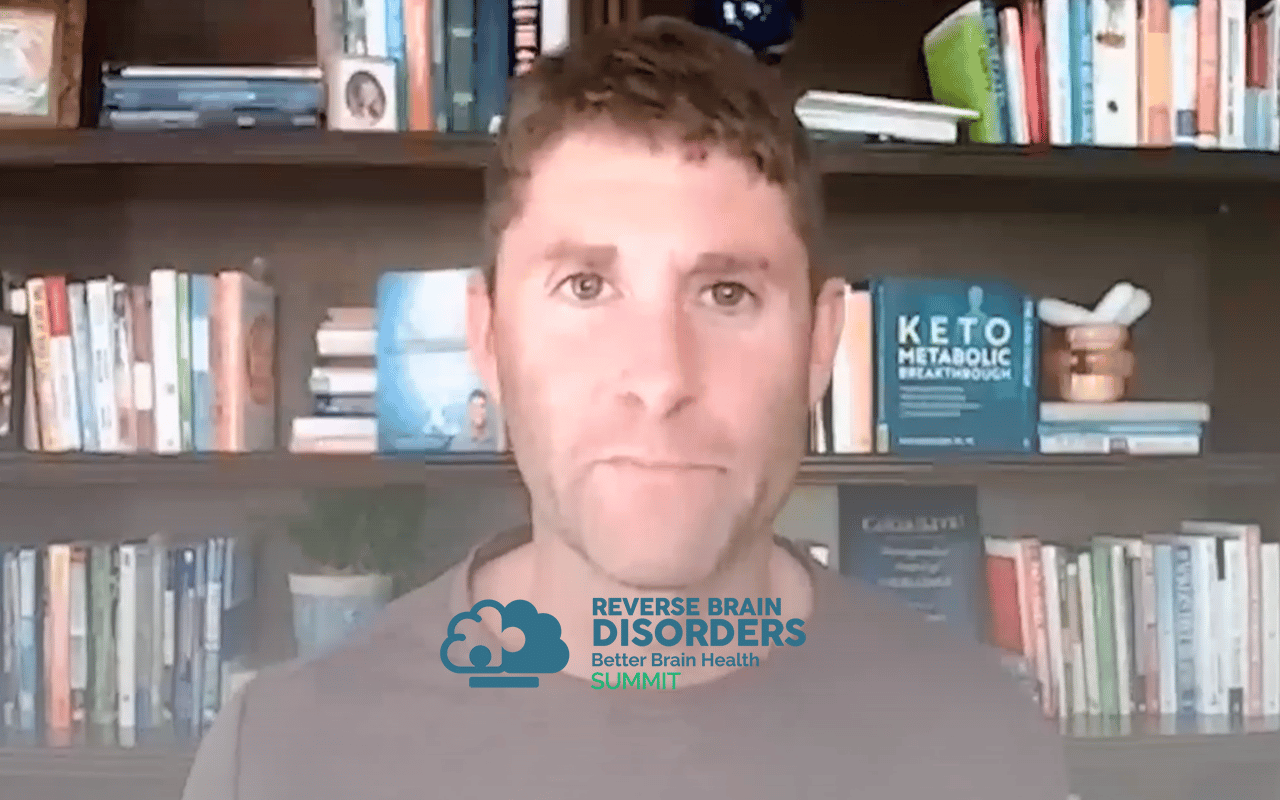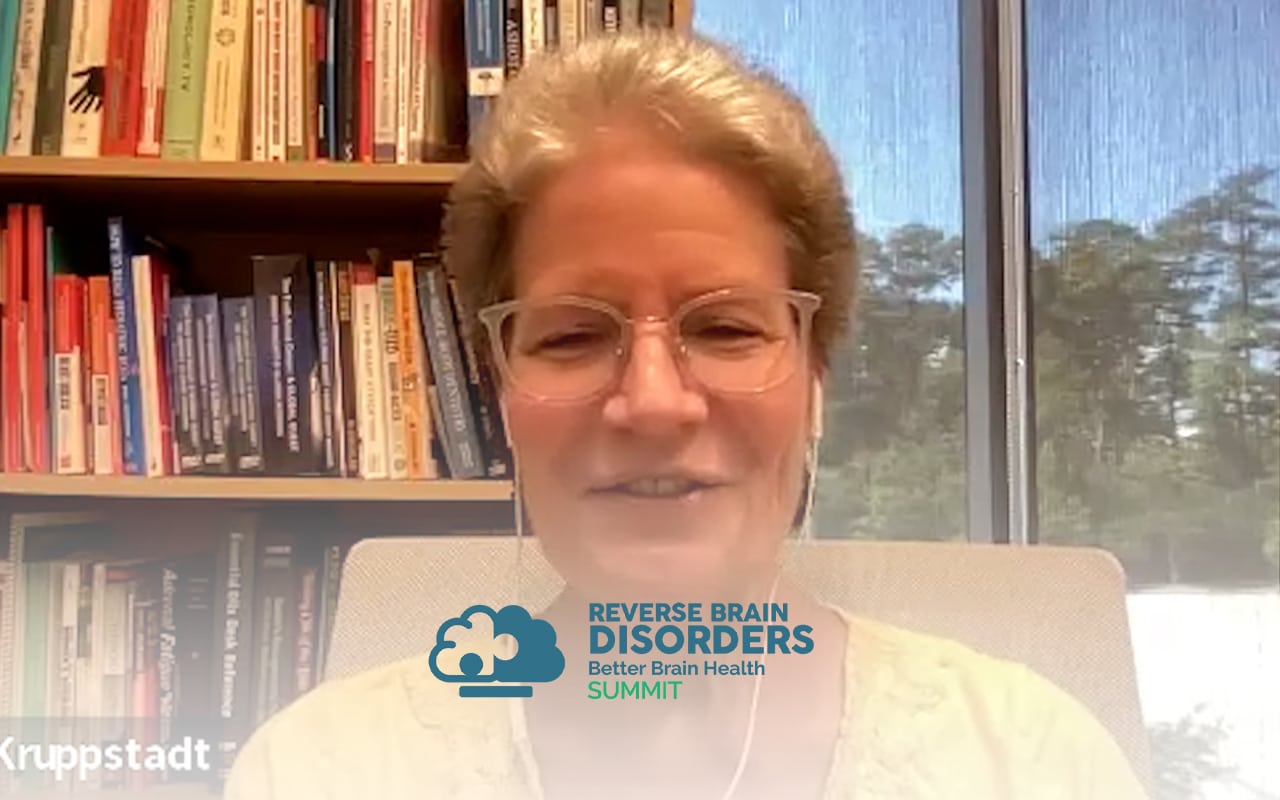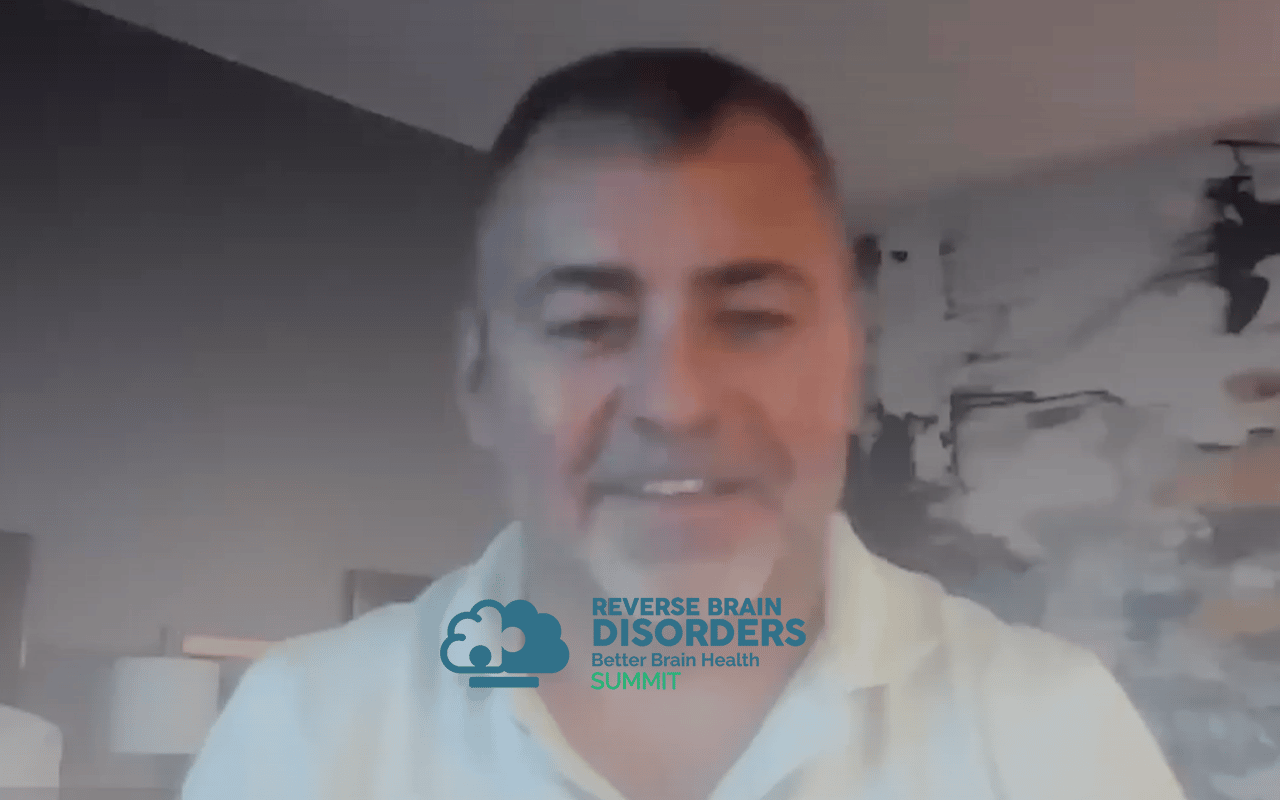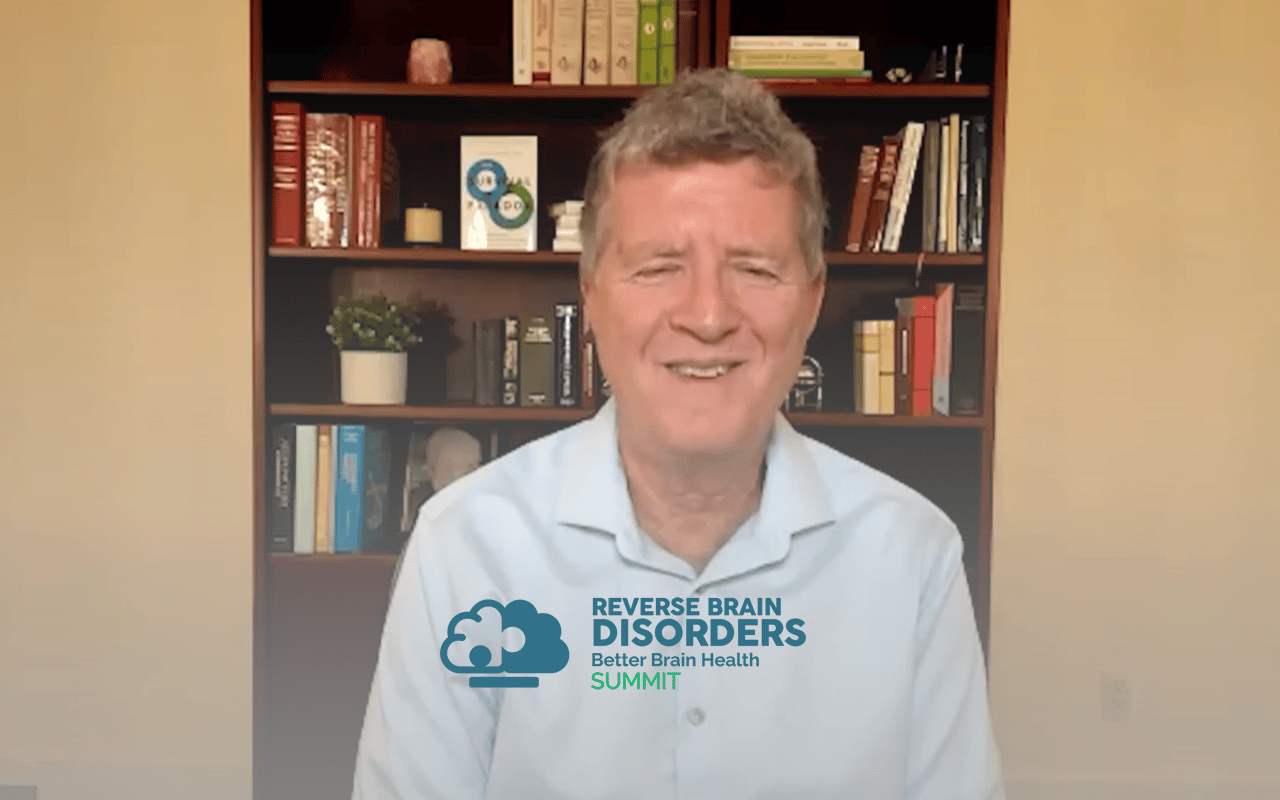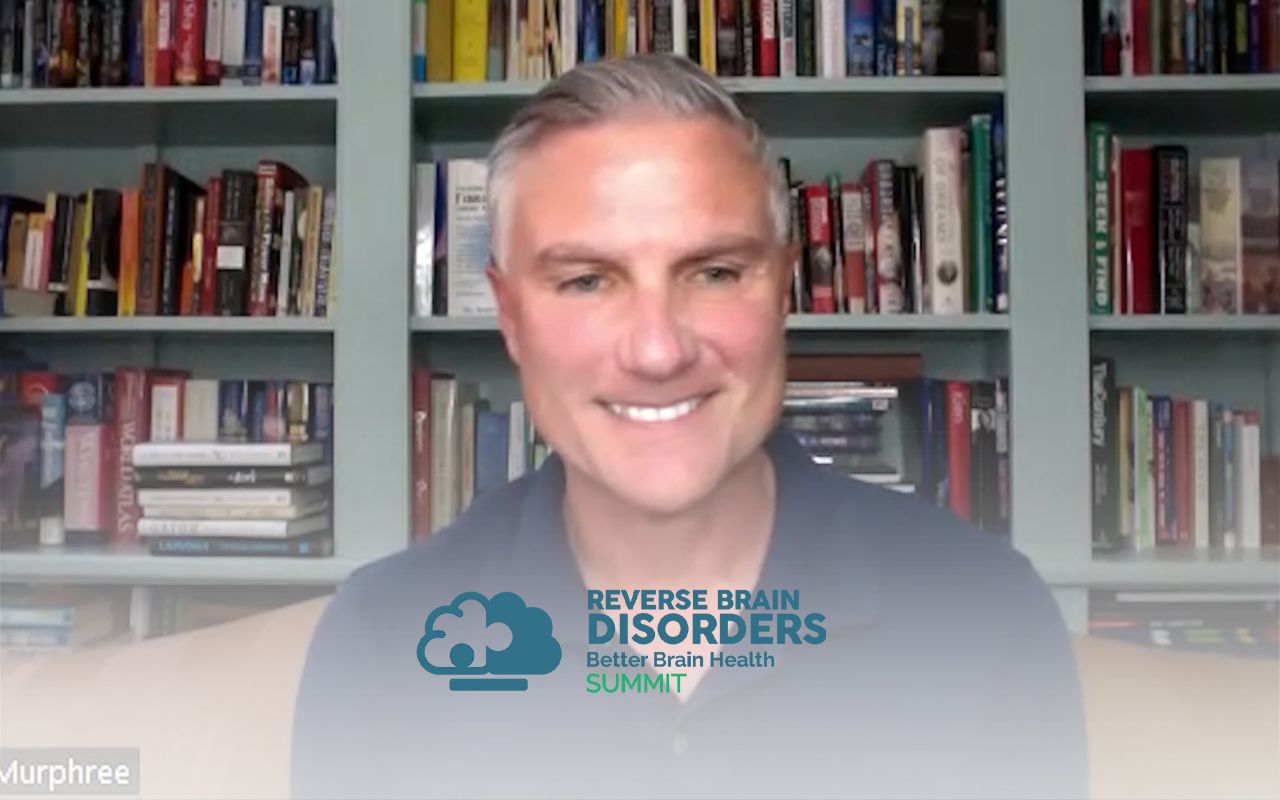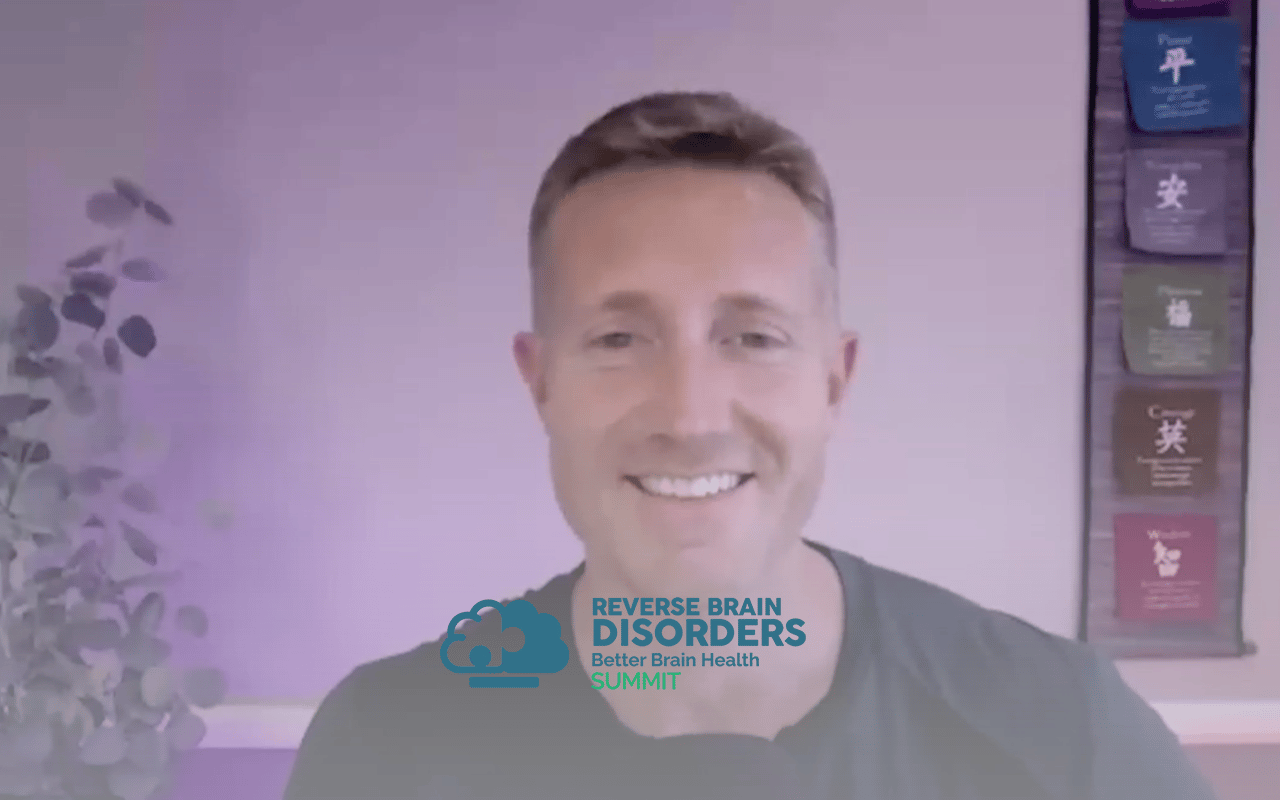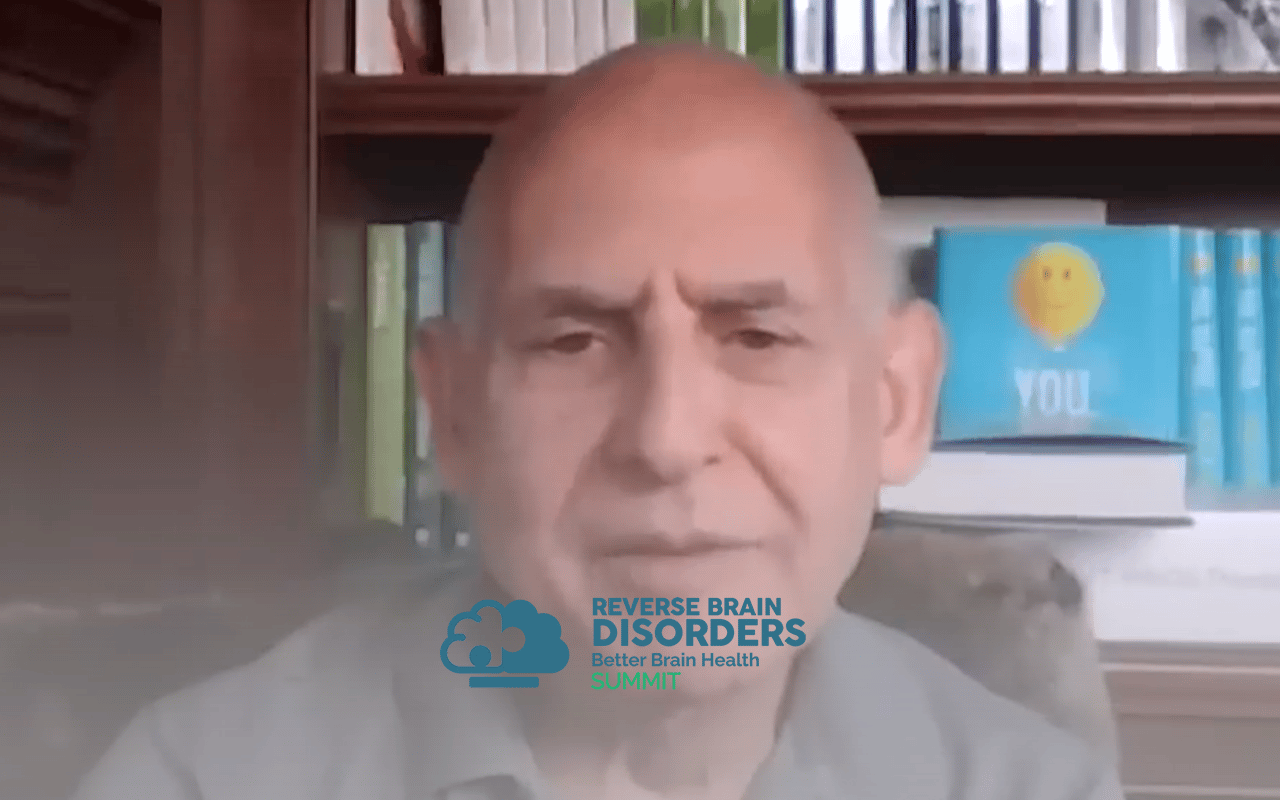Join the discussion below

David Jockers, DNM, DC, MS is a doctor of natural medicine, functional nutritionist and corrective care chiropractor. He is the founder of Exodus Health Center in Kennesaw, Georgia and DrJockers.com, a website designed to empower people with science based solutions to improve their health. Read More
- Beta Amyloid and Protein Toxicity in Brain Degeneration
- The Importance of Melatonin, Circadian Rhythm and Brain Healing
- Causes of Poor Brain Drainage and Detoxification
- Key Strategies to Help the Brain Drain and Detoxify Itself
David Jockers, DNM, DC, MS
Hello this is Dr. David Jockers. And in today’s video I’m talking about how to optimize your glymphatic system to detoxify your brain. And this is so important for good brain health. For good healthy mood, healthy mental energy, really great memory and obviously preventing any sort of brain related diseases. Your lymphatic system may be the secret key and most people don’t know what the lymphatic system is but the lymphatic system is actually a form basically like a circulatory or lymphatic system of your brain. You have these specialized cells called glial cells in your brain and they actually help to they’re basically like the immune function of the brain. And your lymphatic system is like the lymphatic system: it helps to pull away damaged proteins. Right? So for when we think about Alzheimer’s disease for example, one of the characteristics when they look at the brain of somebody with Alzheimer’s disease, they find all this beta amyloid plaque. Well what is beta amyloid? That is a certain type of protein that the brain makes and it helps protect against pathogens. However it shouldn’t build up. We should be recycling it.
So it’s part of our body’s natural immune response. However we should be removing beta amyloid through the glen fat IQ system and when we have poor glimpse glimpse static flow we end up with an overload of beta amyloid that can sit in the brain and it causes a form of protea a toxicity that alters brain function doesn’t allow the brain to be able to heal and function the way that it should. And so when we think about beta amyloid, it’s really a symptom that we have poured lymphatic flow that we have higher levels of inflammation in the brain. Perhaps there is poor blood sugar stability, There’s higher amount of toxicity. There may be a higher pathogen load in the body. And we’re not pulling out these proteins, these protective proteins out of the brain the way that they should and they’re accumulating in large quantities. And that’s a symptom that the brain is atrophying and it’s degenerating.
So when we think about the lymphatic system, we know the brain cells perform autopsy ji which is this form of self eating where they break down old damaged proteins and recycle them and create new healthy proteins. But there’s a lot of metabolic waste that occurs with this. And so then we have these special nervous system cells, the lymphatic cells that come in to scavenge that waste and then the lymphatic system flushes out that dirty fluid. So the glimpse cells take the proteins and they’re all part of this fluid, the cerebral spinal fluid and that needs to be flushed out through the body through the brain. And so lymphatic vessels surround the brain and they deliver the waist to the lymphatic system lower in the body which then cycles that those wastes and gets rid of them through the kidneys, through the through the stool, right through the urine through the sweat is how we eliminate toxins through respiration. And so those toxins in the brain have to get out of the brain.
Otherwise they’re going to accumulate and they’re going to cause more problems. And so our circadian rhythm really impacts argh lymphatic flow and our circadian rhythm impacts obviously our sleep quality or energy throughout the day, mitochondrial health. And so normally we should be sleeping when it’s dark out, so shortly after dark, we start to raise, you know, as, as the sun sets, melatonin, which is our major sleep hormone, is elevating cortisol, which is our stress or, or um are wake wakefulness hormone that is going down and we, you know, obviously that should should improve our, you know, should um influence sleep. And so when we’re exposed to bright lights late at night that will stimulate cortisol and suppress melatonin. And then we don’t get the proper amount of steep sleep, the proper amount of R. E. M. Sleep and that’s going to affect argh lymphatic flow.
So having really good circadian rhythm is super important. We’re gonna go through sleep hygiene as we go on symptoms of circadian rhythm disruption. You’re gonna have sleep problems, daily fatigue, brain fog and memory problems, decreased sex drive, lack of motivation and drive moodiness and irritability. What too little sleep does to your body. We know that people who don’t sleep enough, they end up getting sick more often a study of 164 healthy people, meaning they didn’t, they weren’t diagnosed with the disease, found that those who slept less than five hours per night were more likely to get a cold compared to those who slept seven plus hours, regardless of the demographics or weight, meaning that somebody could be thin, they can be young, but if they’re sleeping less than five hours per night, they’re more likely to get a cold. Not sleeping can make the symptoms of inflammatory bowel disease and acid reflux worse and may put you at more risk of developing IBD, which is inflammatory bowel syndrome and that is characterized by things like colitis, ulcerative colitis Crohn’s disease.
We know again that people who don’t sleep well have depleted sex drive, they have poor vision, they gain weight, okay. They have trouble with losing weight, they end up with higher rates of headaches and migraines and a lot of mood issues and irritability as well. And they have trouble remembering, They have trouble learning. So kids that are not sleeping well don’t learn well in school and adults who don’t sleep well, have trouble with work. They are not able to perform their tasks that they’re asked to at work as effectively. And all of us can really understand that and that’s because the brain is not detoxifying itself And we know the brain is very susceptible to chronic inflammation over the long-term chronic inflammation, chews up and destroys neuronal tissue and leaves the brain weak and impaired. And so brain degeneration by the time you have something like dementia or Alzheimer’s disease or Parkinson’s disease. That is a 30 plus year process of degeneration. And we see extreme shrinkage of the cerebral cortex.
We see enlarged ventricles which are kind of the little gaps in the brain. And we see shrinkage of the hippocampus which is a major area in the temporal lobe. That is where we store memories. And so we want to make sure that that brain is really healthy. Really vibrant, well hydrated and the tissue is functioning at its best. So we need good Glynn fanatic flow in order to again get rid of these bad proteins, get rid of this protein toxicity and allow the brain cells to undergo that the proper process of autophagy support really good healthy mitochondria within those neurons. So again they can function at their optimal. So when we think about sleeping, we know that the science has shown that sleep is critical for helping the brain detoxify metabolic waste. It helps get rid of dysfunctional neuronal cells. So just through the process of metabolism we’re gonna have a lot of neuronal cells that become old. We call them senescent cells, they’re older, they’re not functioning the way that they should normally.
When our brain undergoes this process of autophagy we get rid of these dysfunctional cells or we repair them. And if we’re not doing that we’re not sleeping, that’s that all happens during sleep. If we’re not sleeping well we’re not gonna be able to get rid of those dysfunctional neuronal cells. Sleep also helps us rebuild new neuronal connections, particularly synapses, little gaps between the brain cells. We know the synaptic density is really important, meaning the amount of these little gaps between neurons between nerve cells is really important for the overall connectivity of the brain. The ability to think sharply and quickly to learn well to process information to have creative thoughts. That’s all based around the connectivity of the brain. So really important for that. It helps reset the balance of neurotransmitters. We know that’s super important when it comes to mood issues right? When somebody has mood issues oftentimes there’s poor sensitivity to serotonin to dopamine, right? So a lot of these different neurotransmitters and therefore the person just feels depleted. They feel sad, they feel depressed, lack of motivation. So very important that it’s helping to balance those neurotransmitters. A lot of people get really irritable because they have too much glutamate which is an excitatory neurotransmitter. Not enough gabba. So we really have to balance those and you know the main player there obviously there’s a lot of factors but one of the main players is sleeping and this glymphatic flow. So super critical to support these brain cells. So again five key things helps detoxify metabolic waste helps get rid of dysfunctional neuronal cells this is what happens when we sleep rebuilds new neuronal connections resets the balance of neurotransmitters and improves neurotransmitter receptor sensitivity and we can have enough neurotransmitter. But if we’re not sensitive, kind of like insulin for insulin resistant and the cells aren’t sensitive we’re not gonna get the sugar out of the bloodstream and into the cell. Well it’s kind of the same thing. If we have poor dopamine sensitivity at the receptor site we can produce enough dopamine but we’re not getting the message across to the next neuron.
So we’re not getting the excitatory pleasure reward kind of um goal oriented communication process that dopamine gives. Same with serotonin. Same with gabba right? We’re not getting that if the receptors are desensitized, sleeping really helps to create this proper sensitivity of the neurotransmitter receptors and create the right balance of neurotransmitters. So we get the proper messages across and we’re able to really feel and function at our best. So key causes of lymphatic system congestion. We have to look at inflammation of course blood sugar dysregulation poor sleep quality. So that’s super important. Obviously that’s what we’re, we’ve been focusing on chronic stress, environmental toxins, biotoxin illness so things like mold and mycotoxins. Um lyme disease can play a role there and then also movement. Right? So movement. If you’re too sedentary you’re not gonna get enough lymphatic flow. So super important that we’re getting the right amount of motion.
So we think about blood sugar when we eat a meal we’re gonna have a rise in blood sugar, but we should also have a rise in insulin shortly after an insulin’s job is to take the sugar out of the bloodstream, put it in the cells kind of like a lock or I’m sorry, a key going into a lock. It opens up the door on the cell to bring sugar into the cells where it can be used for energy. We don’t want too much sugar hanging out in our bloodstream because it’s not doing any good when it hangs out in the bloodstream. It’s feeding pathogens and it’s uh combining the proteins. Actually the sugar molecules will bind to proteins and create sticky proteins, things we call advanced application and products and these advanced applications and products will actually degenerate and atrophy of the brain. So they actually damage the figure lining the blood vessels. They cause poor um circulation and perfusion into deep regions of the body. They can increase the risk of cerebrovascular disease, coronary heart disease, kidney dysfunction because they’re damaging the endothelial lining of the blood vessels. So what do we do? We produce insulin, insulin takes the sugar out of the bloodstream so we don’t create these advanced application and products and instead it puts it into the cell where it can be used for energy. The problem is when we’re burning sugar for fuel that’s going to create a lot of oxidative stress within the cell. The cell can only handle a certain amount of oxidative stress at a time. And so insulin it modulates its insulin receptors based around how much oxidative stress it can handle when we have too much sugar coming into the cell and we have too much oxidative stress occurring in the cell. We are going to have less sensitivity on those insulin receptors. The cells are gonna going to create a process that down regulates insulin receptor sensitivity. Now it’s harder for us to get insulin into the cell. I’m sorry, blood sugar sugar into the cell because insulin has to knock at that door louder and louder and louder for it to open up. And then we have problems now with some individuals they will produce, they will still have a level of insulin sensitivity but they’ll produce too much insulin. So they have a dis regulation so for some people that will have hyperglycemia and their insulin levels, uh they won’t be able to get the sugar out of the bloodstream and get it in the cell effectively.
And so the blood sugar go way up and it will stay up. But for others, their blood sugar will go way up. They’ll secrete a ton of insulin enough to get that sugar into the cell and I’ll actually over produce the insulin. And so now they’ll drop their blood sugar down too low and we get into this state of hypoglycemic to and we’ve probably all been there, We end up with the feeling of hungry when we’re hungry and angry. Um We’re irritable. So we have oftentimes a headache. Some people feel nauseous. You know we just don’t feel good. And that’s because our blood sugar is too low and the blood sugar goes too low. That’s really damaging on the brain as well. That ends up causing your oxygen toxicity and the death of neurons. And so it’s really critical that we get food in our system when that’s the case.
And a lot of people will say well I can’t fast I can can’t go you know more than three or four hours between meals because I get low blood sugar I get hypoglycemic. Well this is an issue with blood sugar dysregulation and we need to start consuming meals that cause blood sugar stability and the right amount of insulin to be released. And so getting blood sugar balance is super critical. We also have to think about EMFs And just our overall EMF exposure. We know that electromagnetic frequencies can be a problem. They come from electronic devices and appliances including x rays, airport scanners, M. R. I. Machines, Bluetooth radios, microwaves, cell phones of course. And so we’ve got to limit our exposure in today’s day and age. Most people are being exposed to a tremendous amount of electromagnetic radiation and very little natural electromagnetic frequencies. The natural electromagnetic frequencies are very healing for our bodies. And that’s because our ancestors, You know it’s kind of built into our blueprint that these EMFs are harmonizing. So getting out in nature forest breathing right? Just going out forest bathing, I should say just going out into a forest. For example, they do this often times in japan where they take these businessmen who are stuck in a in a city, very few trees, very you know very little nature and they’re stressed out, they’re anxious, they’re depressed and they put them out into the forest for you know, they stay in like a little cabin in the forest for a week or a month and they just get out in the forest and they’re around all these healthy electromagnetic frequencies. They’re breathing in natural essential oils that are coming from the trees and the plants and it’s very therapeutic and their depression goes away. Their anxiety goes away.
They feel significantly better than they go back to work. Now. We want to have a regular practice where we’re getting out in nature. I like to go barefoot on grass, dirt, sand that really helps support natural electromagnetic frequencies. It’s almost like I consider grounding my body by putting my bare feet on grass, dirt, sand, just getting out in nature like that, like showering my electromagnetic field. We know that too much EMF Exposure affects the uh lymphatic system. It affects the lymphatic flow, it affects the amount of oxidative stress affecting the neurons so creates more propio toxicity and limits our ability to drain and detoxify our brain. Getting out in nature. Getting sun exposure, grounding our body getting around trees and plants and those healthy E. M. F. Helps to optimize lymphatic flow. It helps to optimize mitochondrial function. It helps to optimize neuronal autopsy G. Where we break down again these older damaged proteins and organelles within the cells and we recycle them. So getting out in nature getting naturally EMF exposure is super important.
Now of course in our society day we’ve got 5G as well. We really don’t know overall all the side effects that are going to occur with 5G. But we don’t do know that it increases the overall amount of oxidative damage. It can disrupt the cell metabolism. Melatonin reduction. We’re seeing an increased blood brain barrier permeability. There are a lot of different issues that can take place with 5G. And so it’s even more important that we’re getting out in nature to help buffer, help buffer the effects of 5G. And support static flow and reduce oxidative stress in our neurons. Now here are the key action steps to improve lymphatic flow. We gotta prioritize good sleep and I’m going to talk in more detail about all these things but to start this is the list prioritize good sleep anti inflammatory nutrition plan intermittent fasting for blood sugar stabilization and to increase autopsy G. And um break down these older damaged proteins within the cells regular movement and exercise. So critical that really is important for lymphatic flow is just getting regular movement, going out for walks, exercising, doing strength training. Just getting movement. Movement is key for lymphatic flow in general and particularly the glimpse system in the brain.
We want to reduce stress, practice, gratitude and meditation. That’s really important. Chiropractic care can be really key if the bones particularly in the neck or also in kind of the sacral area. The sit bones down there. If those are not moving well, that’s going to affect your cerebro spinal fluid which is kind of what pumps through your nervous system, your spinal cord and into your brain. And it’s going to impact the amount of glimpse, static flow and the amount of waste that you’re able to drain from the brain. So chiropractic care can really help their massage therapy can help omega three fatty acids have also been shown to help support neuronal flow. Bio active carbons can be really helpful for vic acid. For example, Hugh mc acids can be really helpful here in the lymphatic system. Some herbs that can be really good um for supporting lymphatic flow and then also red light therapy and near infrared can be very helpful here too. So let’s talk about melatonin. Melatonin helps drive lymphatic flow and it’s also obviously critically important for our circadian rhythm and it’s produced in the pineal gland in response to the lack of light stimulation.
So when we don’t have enough light, when there’s you know when the sun goes down for example we don’t get the light stimulation and we get melatonin production when we have light it signals the pineal gland which puts the brakes on melatonin production increases cortisol. Now melatonin is also the greatest mitochondrial antioxidant, really the greatest antioxidant that our party produces and it slips into the mitochondrial double membrane where it helps to regulate superoxide superoxide levels. Which is a powerful um free radical. It helps to balance out hydroxyl free radicals. Right. So it helps to quench a lot of these oxidative stress components with that are produced from metabolism within the cell helps activate the lymphatic system helps regulate the gut microbiome improves overall immune and inflammatory process. And of course what it’s known for is regulating the circadian sleep wake cycle. So good sun exposure throughout the day actually is very supportive for melatonin.
So getting the proper amount of sun so early morning sun is going to be more red light and infrared right? Which is actually really good for reducing inflammation, stimulating the right amount of cortisol to give you that wakeful response during you know midday you’re going to get more of the UV rays which stimulate vitamin D production. That really help to charge your mitochondria as does the red light and the infrared and in the evening you’re getting that red and near infrared. And um and then of course when the light goes away now you’re going to get a really good melatonin release. So the more that you get good light, natural light stimulation during the day, it’s actually set you up for better melatonin production in the evening and better brain drainage and brain detoxification through better sleep quality in the evening. And overall you’re gonna have better mood and better energy. So one thing to do at night is when the sun goes down right, you get sun during the day, but when the sun goes down, you put blue light blocking glasses on blue light blocking glasses make everything look kind of red. So red light is not melatonin suppressing, that’s red light is what we see at sunrise and sunset. And so at sunset, the red light that’s coming out will not suppress your melatonin melatonin is going up at that point there’s less UV light in the there’s less blue light, UV UV rays coming down. And so now your melatonin is going up then the sun goes down. If you go back in and you turn on artificial lights, if you turn on blue lights, if you’re in front of screens, things like that without any sort of protection from blue light blocking glasses, then that’s going to suppress your melatonin production and you’re not going to get the right kind of sleep and brain detox that you need. So it’s really super important that you are doing something, whether it’s put, you can get a red incandescent light, for example, that that you can use if you’re reading or something like that. But if you’re looking at screens, anything with blue light, make sure you’ve got your blue light blocking glasses. There are programs and I know they’re built into like the iphone now with the eye dot flux where it will actually reduce the amount of blue light coming out.
But even with that, there’s still a good amount of blue light. So it’s important that you put on your blue light blocking glasses and what you should notice is actually healthy response. You put on your blue light blocking glasses, let’s say 89 o’clock and you actually should feel more tired. And that’s actually a good thing. That’s a sign that your body is producing that melatonin getting you ready for good quality sleep. And that is what we’re trying to accomplish here. So blue light blocking glasses can be really helpful and then tips for a great night’s sleep, have your room cool. Keep it as dark as possible. Use a sleep mask. I have a mask over my eyes. So any ambient light that’s coming in doesn’t affect me and a sign of a really good, healthy circadian rhythm is that you should be affected by light meaning that like for me when light starts coming into my room in the morning from the sun, I wake up. So it’s almost like immediate.
Like I’m waking up right at sunrise because my body is attuned to where, when it’s very when it’s dark and I’m not exposed to blue light I’m sleeping. And then when some light starts coming in, it tells me ok, it’s time to wake up. Melatonin levels are lower in the morning, they’re at their lowest, you know. And so then my body naturally produces more cortisol and it gives me that wakefulness. That’s super important. You don’t wanna do caffeine too late. Some people are very fast, caffeine metabolizes and they can do it. But most people cannot do caffeine within eight hours of sleeping. It will affect good sleep quality and their lymphatic flow. Now I don’t have this in here. But actually good sleep posture is important. We know that sleeping on your side the fetal position side sleeping actually increases your lymphatic flow as compared to sleeping on your back or on your stomach. Sleeping on your side is what our ancestors have done for quite a long time. And so that side sleeping has our bodies adapted to get a better glimpse static flow, lymphatic drainage when we are side sleeping. So that’s key. You don’t want to eat within three hours of sleeping if you’re eating too late at night, that is going to block melatonin production. It’s going to block the proper Glyn fanatic flow on top of that, you may also have symptoms of acid reflux. You may feel like you need to incline your pillow more and lay on your back. Which can you know increase which can decrease the reflux but also affect your your lymphatic system as well. So a lot of people when they eat late at night that affects your digestion and obviously affects your melatonin as well. So not not a good setup for good sleep. Get sun exposure during the day. Like I was talking about exercise regularly but not too late. If you exercise too late at night, you’re going to overstimulate your system. So kind of like not eating within three hours of sleeping, I wouldn’t exercise within three hours of going to sleep. So if you’re going to bed at 10 I wouldn’t exercise after seven p.m. For example, And so that’s key. And you also want to get more sleep.
But you know before midnight, okay every hour of sleep before midnight is equivalent to three hours of the regenerative capacity of sleep after midnight, meaning that if you can get an hour or two hours of sleep before midnight you’re gonna feel so much better, you’re going to get better glymphatic flow, brain, brain drainage, more melatonin production, better human growth hormone, better fat burning um better mitochondrial producing sleep than if you’re sleeping, getting most of the sleep after midnight. So going to bed early can be really helpful. I recommend winding down after nine p.m. So you should not have any goals that you’re trying to accomplish. No serious goals after nine p.m. If you have goals you’re producing excitatory neurotransmitters, dopamine cortisol in order to help you accomplish those goals. So if you’re like well I just want to finish um you know writing this paper or sending out these emails or working on this project, you’re gonna get a second wind. A lot of people will say that I get my second wind at night. Well that second wind may feel good at the moment.
It may help you with your productivity at the moment. But it is sacrificing good melatonin. It is sacrificing good lymphatic flow and brain drainage and that will compromise your overall health in the future. So you don’t want to do that nasal breathing. You want to as much as possible breathing out of your nose that really helps activate your parasympathetic nervous system which is associated with resting healing and digestion. Nasal breathing puts the brakes on our fight or flight sympathetic response and allows us to oxygenate and heal at a higher level. It increases nasal nitric oxide levels which increases whole blood oxygen by 15%. And so you think about that. What’s that gonna do? Obviously it’s going to really support your mental and emotional health. It’s going to support healthy neurons, reduce brain degeneration and inflammation in your brain and set you up for better energy throughout the day, better mental clarity throughout the day, better sleep quality and lymphatic flow at night. So nasal breathing throughout the day, doing your best when to be aware of how you’re breathing throughout the day. And then at night. What I do is I just put some tape over my mouth called mouth taping. And you can train your body to breathe out of your nose and so do this for a few weeks. Put some tape over your mouth, some surgical tape um over your mouth at night and that forces you to breathe out of your nose. And so you’re getting that nasal breathing that’s going to help set you up for better sleep quality. And also it’s going to train your breathing mechanism just to breathe more from your nose. Obviously there are times when you breathe out of our mouth like when we’re exercising at a high intensity, but for the most part we should be breathing out of our nose. Most people are not. Most people are mouth breathers and there’s a lot of sleep disordered breathing uh whether it’s sleep apnea or you know, just snoring in general, that can be eliminated through mouth taping right through helping the body to breathe out of the nose.
Now for some people um you know, it’s going to take some time to get used to that however, as much as possible. You know, just putting the tape on your mouth forces you and you can try it during the day and that will, you know, if you’re worried about doing it at night, you kind of see how your body responds to it and then that may help you adapt and become more comfortable with doing it at night. I just started at night, you know, I started doing this several years ago and at first it felt very awkward, but my body adapted very quickly, I would say by like the third day, it was no big deal. And I was still able to sleep well and even on day one and two, it just I just noticed it. I noticed the tape. It felt unusual and but my body adapted. I was able to breathe out of my nose, still got great sleep. I tracked my sleep scores with a ring and I felt great. I felt like I was sleeping really, really well and my heart rate variability, which is a measurement of my parasympathetic nervous system, has been improved since improving my nasal breathing. And that means that I’m getting better recovery when I am sleeping.
Now. Let’s shift into nutrition. We obviously want to eliminate pro-inflammatory foods that’s going to be refined grains, um all your kind of grains and and a lot of your starches, uh your processed foods, you want to get rid of those. We want to get rid of deep fried foods, packaged foods. Um grain fed meats as much as possible. Fast food soda, you know, things like that. And then seed oils, commercial salad dressings that have corn oil, safflower, soybean oil, cotton seed oil, things like that. We want to get rid of those. We want to focus on grass fed pasture, raised meat, poultry and wild game. Lemons, limes, berries are really great for the body, great for blood sugar stability, Great for brain health, berries have a lactic acid and anthocyanins and resveratrol that really supports mitochondrial health supports our microbiome. So I’m a huge fan of adding berries into your diet, avocados and avocado oil. Green tea which has connections that are very supportive for good brain health. And it also has theon in which is really good for neurotransmitter sensitivity. Serotonin really good for relaxation and sleep. So green tea can be great, non starchy vegetables. So broccoli, cauliflower, asparagus, things like that which have a ton of nutrients and very, very little amount of starch or sugar, good herbs like turmeric and ginger, garlic, onions, chives, basil, oregano, thyme, rosemary, sage. These things help stimulate autopsy within ourselves. They have different polyphony, all compounds that reduce inflammation and tell the cells to heal and repair themselves. So that sort of food information. That’s really the way I look at food is, it’s a source of information for our body and that sort of information tells the cells to become stronger and more stress resilient. Extra virgin olive oil. Amazing tons of polyphenols. You have things like Aaliyah candles and hydroxy tyrus all which hydroxy tyrus all crosses the blood. Brain barrier reduces inflammation in the brain. Aaliyah can reduce inflammation throughout the body. They also have anti cancer benefits as well. Fermented vegetables can be really supportive. Things like apple cider vinegar, sauerkraut, pickles, things like that kimchi really supportive for gut microbiome health and allowing the gut to produce the right amount of B vitamins to support brain health.
So that can be really helpful. Wild caught fish which is rich in omega three fats. Omega three fats play a key role with arg lymphatic function is one of the most well studied nutrients for lymphatic flow. So getting the right amount of omega threes to omega six is critical. So consuming, getting rid of all those seed oils and consuming things like wild caught salmon. Wild caught seafood can be really helpful for getting the right amount of omega three’s as well as grass fed. We can get those from grass fed pasture raised animal products as well. So these are the kinds of things we want to be consuming on a regular basis, coconut oil as well. Actually coconut oil has M. C. T. Fats medium train triglyceride fats which turn into ketones which help down regulate inflammation in the brain and help improve lymphatic function ketones actually help support good brain drainage and brain detoxification. So super helpful getting good movement.
So I say there’s a big difference between movement and exercise movement is any sort of movement that you’re doing in a low intensity without specific physique related goals. Whereas exercise is something you’re doing at a very high intensity with a goal to build strength. For example build muscle, build endurance, burn fat movement, could just be going out and taking walks and movement is super critical for your health. It helps improve circulation, stimulates lymphatic drainage, enhances tissue oxygenation, helps balance your key brain neurotransmitters fact going out and just taking a walk is like your greatest antidepressant taking a walk outside particularly in the sun is way better. It performs way better in studies than taking an antidepressant medication. So just getting out moving your body will help balance a lot of these neurotransmitters particularly also moving it and getting sun exposure whenever possible. Super key here reduces stress, movement, reduces stress and tension in the body, improves mood and happiness and enhances your mental clarity and your memory. So get it, get regular movement throughout the day and also incorporate exercise as well. Chiropractic care helps align your spinal bones which actually provide movement information. Something called appropriate reception. A powerful amount of it into the brain. Pro preconception is movement information. So the brain is constantly getting information from the spine and from all the joints as to where you are in space and it does that through these receptors called McCann a receptors and that are in all of our joints and in particular your you have an incredible amount of density, McCann a receptor density in your spinal bones in particular the ones that are at the top of your neck, your upper cervical. And when those are misaligned, that’s gonna send bad messages up into the brain messages that are not going to allow you to adapt to your environment well.
And also they’re gonna trigger more if there’s if there’s problems there if they’re not moving right actually increases your sympathetic or your fight or flight nervous system, chiropractic care can help realign and take stress off those areas which allows for proper appropriate deceptive information to get into the brain to allow you to know your spatial awareness and improve all elements of brain function more effectively and helps to improve the balance between your sympathetic your fight or flight nervous system and your parasympathetic rest. He’ll digest nervous system and so chiropractic care can be really, really helpful there. I also mentioned massage can be helpful. There’s other things like acupuncture that can be helpful as well. I’m also a big fan of red light therapy and in particular red light device that also has infrared that is really good for stimulating mitochondria. It’s very very good for improving circadian rhythm and sleep. Now if you’re able to you know get outside and watch the sunrise and the sunset every day you’re getting infrared, you’re getting red light therapy.
So that’s great. Now you can also buy device there’s certain devices that will do this and they help you know obviously to concentrate the red light and the infrared so you get an even stronger dose than sunrise and sunset which can support your skin, your collagen production, your mitochondria in your body. Really great for circadian rhythm and sleep supports tissue healing and repair. So skin skin issues and also just inflammation and pain in your body. So I’m a huge fan of that and then clinical benefits of EPA And DHA this is the long chain omega three fats that we get in fish oil for example and in wild caught fish. We know that DHA Is the very long chain omega three super powerful for brain health and supporting lymphatic flow. So also good for eye health, cognitive function. EPA is just a little bit two carbons shorter than D. H. A. And it’s very good for a wide variety of things including inflammation, keeping inflammation under control and our cardiovascular system and joints are immune system, things like that. However D. H. A. Is the main player when it comes to brain health. We can get that from algae. There’s algae based DHA oils and of course fish oil, krill oil and then eating wild caught fish and wild caught seafood. Great sources of D. H. A. You can also get it from grass fed animal products, pasture raised eggs as well bio active carbons they can be really helpful particularly if you’re dealing with any sort of pathogens in your system and toxins, mold mycotoxins um you know bacteria, increased amount of bacteria or parasites in your bloodstream that could be affecting brain health. Bio active carbons are like full vic and Hugh mc acids that come from deep in the earth and they have poly electrolytes that really and they’re so small phobic acid that I can go into cells. Pull toxins grab the toxins and pull them out so and it can also deliver lots of different nutrients and minerals into into you know deep within cells.
So I’m a huge fan of using bio active carbons to help detoxify cells and help bring uh you know more minerals help mineralized cells and that can help with lymphatic function and circadian rhythm for sure magnesium. If there’s one supplement outside of what I talked about you know I talked about Omega threes, I talked about those bio active carbons. Magnesium can be really helpful. We know that magnesium really helps to balance neurotransmitters. Most people are magnesium deficient magnesium plays a key role in over 300 functions in the body when you’re under stress. You’re depleting magnesium when you have blood sugar imbalances you’re depleting magnesium. So magnesium is the body what oil is to a car. So the more we’re using our body the more magnesium we need most people are not getting enough in their diet, they’re not absorbing enough magnesium. So taking a magnesium supplement I would say that’s probably the number one supplement that I give to people where they notice the difference right away. Right.
They take a scoop of for example a good quality magnesium product and it’s like wow I I noticed that with my brain just felt more calm, more relaxed. I slept better at night. I woke up more refreshed, had more energy in the morning, was able to concentrate better throughout the day. So magnesium can be really really powerful and when we look at different forms the best forms are going to be magnesium mallet glisten eight chloride, magnesium chloride, magnesium torit, magnesium or irritate magnesium citrate and magnesium L three and eight. The ones that we want to avoid are gonna be well at least knowing we may not necessarily avoid them but just knowing that they have poor absorption are gonna be magnesium oxide that’s mostly used as kind of a bowel mover. It’s like a laxative and helps move your bowels so it’s fine for that. But don’t think of it as you know supporting brain magnesium levels. Magnesium sulfate which we get an epson salts. It’s great to take you know in a bath. Not good to consume, you’re not going to absorb as much of that magnesium magnesium die hydroxide which is the milk of magnesia. So it’s of course you know a laxative magnesium aspartame magnesium carbonate, not as good forms whereas the magnesium mallet glisten eight chloride torit irritate citrate and L.
Three and eight are the best. Now L. Three and eight has been the one that has the best research for crossing the blood brain barrier and reducing stress anxiety and improving learning memory and sleep. So it’s the most well studied for that. However I will say that you know when people take magnesium citrate Although that one tends to be better for muscles right reducing muscle tension a lot of times people notice they sleep better, they notice that they have less anxiety. So some of the other forms outside of the L. three and eight can definitely improve brain health. But that’s just the one that tends to work the best when it comes to overall neuronal health, brain health and um helping with lymphatic function. So best thing that’s a good thing to remember. Um Now the R. D. A. For magnesium for adults between 300 to 420 mg daily we typically recommend 450 to 800 plus milligrams daily for optimal health for adults depending on age, body size, stress levels, medication usage or certain medications, antibiotics for example. Diuretics, blood pressure medications um statin drugs that deplete magnesium levels. So if you’re taking medications any medication pretty much um taking some extra magnesium can be helpful. Many people take magnesium to bowel tolerance. So when you get loose stools. That’s the way you know, you took too much magnesium.
So it’s good to just back down a little bit find the right dosage to where you feel good, but you’re not getting um loose stools and that’s really the best way to dose magnesium and then when it comes to sleep and when it comes to the lymphatic flow, I really like our mag sleep that you can find on drjockers.com. It’s a combination of highly absorbable magnesium and relaxing, adapted jin’s things like wild cherry. Um It has got lavender in it, right, has got, you know, a bunch of different compounds in there that support good sleep quality and it’s been clinically proven to show that. So hopefully this is a great training for you guys and you got a lot of value out of it. So um you know, please share this with other people that you know and that you care about because optimizing lymphatic flow is super critical to overall brain neuronal health, your mood, your memory, and your mindset. So you want to do everything you can to optimize sleep quality melatonin production and lymphatic flow. And you learned about that in this presentation. So again please share that with somebody that you know, you care about and we’ll see you guys in a future presentation, everybody be blessed.
Downloads

